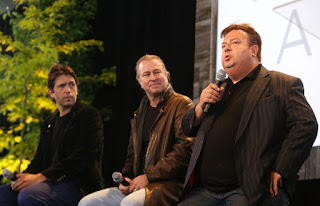Rangasthalam (2018) - nostalgic telugu nativity of 80s
Rangasthalam (2018) – rating (4/5)
Cast : Ram
Charan Tej, Jagapathy Babu, Aadhi Pinisetty, Prakash Raj, Samantha
Director :
Sukumar
Review by
Zulfiqar
Revolution is a never ending relish-of-a-concept
in movies. But with Telugu movie industry having got inclined to answer to the
whims of commercial box office returns with formulaic, mindless romances, the
real stories and concepts have been pushed to the background. There are only a
few scattered telugu movies in the last 10 years, which would define the
advances made in the industry. A political drama like ‘prasthanam’, fantastical
tale with technical flamboyance as in ‘bahubali’, dejected lover’s daring
reasoning of his feelings in ‘Arjun Reddy’, recent psychological thriller ‘awe’
and a few more probably.
Sukumar’s Rangasthalam belongs to
this meager cluster of movies, which matter much to make a wave of change in
the way of filmmaking and storytelling.
Rangasthalam not only has every
colour in its palette, but also dishes out a fine rainbow of final image. This
is resplendent in just not in its vision, but in evoking thought and moving the
chords of emotion. It is chockablock with great performances, acute technical
details, fine music and even occasional strong moments of heroism.
The movie is set in the rural life of
80s in a fictional village, named Rangasthalam. A partially deaf irrigation-motor
runner, Chittibabu (Ran Charan Tej), gets in the eye of a storm of the village’s
rebellion against the feudal and oppressive landlord called President Garu,
whose real name is Phanindra Bhupathy (Jagapathy Babu). The rebellion is
started by Chitti babu’s elder brother, Kumar Babu (Aadhi Pinisetty), who resorts
to run against Phanindra Bhupathy in elections, after seeing the whole village
debt ridden and exploited by the cruel and tyrannical President. Chittibabu
stands behind his brother like a rock when he is invited by the opposition
party’s leader, Dakshina Murthy (Prakash Raj), to run as his candidate. The movie
starts with Dakshina Murthy meeting a grave accident, while Chittibabu rides on
his bicycle to meet him. the movie flashbacks from there to the earlier events.
The movie’s main focus is on the
rural feudalism in 80s Andhra, which had caste-distinction and tyrannical
politics. The movie though long at 2 hours and 50 minutes doesn’t even has a
single dragging moment with its scenic locales, catchy numbers and nativity
laden dialogue and humor. The movie’s main strength comes from the acting
talent, primary of them, the lead – Ram Charan Tej.
Ram Charan Tej acts his career best
role with a diligence and professionalism, very hard to find in modern Telugu cinema.
He has been professional in Magadheera and Dhruva, getting his body in shape
for the role. But here he hones his acting chops. In rangasthalam, as the
villager, he fits the bill with his walk and talk. He has a certain swag with
great body language carrying off the role with a great ease. He makes chemistry
work with everyone in the cast starting from the female lead, Samantha to his
family members (aadhi Pinisetty, Naresh), village friends and many other
characters. He is divine in the moments where he tries to recuperate an
invalid, servicing him in every possible way. As Chittibabu, this is his crowning
moment, in his film career.
Aadhi Pinisetty is a great second
fiddle fitting his role as an innocent and morally straight brother. Samantha
does a marvelous village belle transformation for her role as Ramalakshmi, love
interest of the lead. The tutelage of Sukumar could be clearly seen in the way
she looks innocent and also with odd facial expressions, making her more
natural. The supporting cast of Jagapathy babu, Anasuya, Prakash Raj give apt
performances in line with the spirit of the movie.
Art Direction by S Rama Krishna and
Monica Niggotre draws out a nostalgic canvass with rural architecture, making
the characters look more plausible. Rathnavelu’s cinematography has
observational angles. Starting from the interiors of the huts, equipments on fields
to the atmosphere of the old hospitals with its outdated equipments the movie
breathes fresh rural air through the screen onto the audience. The script is
greatly aided by a good dialogue writing with Godavari slang giving the village
life a more authentic touch. Music by Devi Sri Prasad has a freshness to it and
more in line with the story spirit.
The mark of great direction in this
movie could be seen in the way, Sukumar focuses on minor aspects like the
setting around the hospital. See, how it is crowded and the hero is seen
cooking a meal outdoors. Look at the way, Chittibabu carries his sickle in a
knitted bag. Look at the villagers carrying carriages for food in copper boxes.
These small things add a lot to the big picture. There is no doubt that Tamil
movies too are clinical in this approach. But, while they have shock value, ‘Rangasthalam’
has frank value. Along with that he makes many creative moments like when the
lead enters heroine’s home at midnight thinking he isn’t making much noise,
while he awakens the whole house.
Sukumar’s handling of
the script and his strong story with the coordination of technical details
makes ‘Rangasthalam’ a gem in the recent history of telugu cinema. He doesn’t fall
prey to the commercial elements and stays true to the script, which is playing
out a potential, moving drama amidst a stage accurately set. The
professionalism involved may bear fruit and give out more such examples. Hoping
many such movies from him and this part of the global cinema.



Comments
Post a Comment